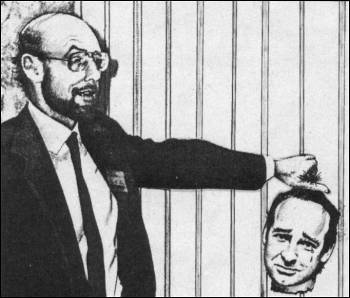| Sinclairvoyance |
HITTING someone over the head with a rolled-up newspaper may not be featured in the latest guides to modern business practice but it is a certain way of making sure you hit the headlines.
It is definitely a more entertaining way of settling your differences than bringing in the lawyers. Cheaper and more effective as well, if the festive season disagreement between Sir Clive and his arch-rival, Chris Curry of Acorn Computers is anything to go by.
Following the tortuous road of legal processes to obtain redress can always ensure that the original course of the dispute will be remembered far better than the outcome. The Rule of Rolled Newspaper, on the other hand, ensures headlines and the immediate opportunity to put the record straight. It is more satisfying too.
It does help if you are the media's favourite new technologist and if the object of your spontaneous irritation is a former colleague and most serious competitor, but it opens up many new possibilities which could hit the pockets of the legal profession and provide the need for a new correspondent in the newspapers.
Perhaps the battle for circulation in the popular tabloids could be settled with rolled-up copies of the Mirror and the Sun held by Robert Maxwell and Rupert Murdoch instead of Bingo; elections could be decided by Margaret Thatcher and Neil Kinnock with copies of the Daily Telegraph and the Guardian.
Readers will have realise by now that the basis for a this speculation is the incident which occurred just before Christmas at a public house in Cambridge and which is related in more detail on the news pages.
The fact that it took place between two grown, apparently intelligent, men says a great deal about the competitive nature of the home computer market and the rivalry between the two industry chiefs.

When Sir Clive set up his first company, Sinclair Radionics, one of his employees was Chris Curry. He worked as a technician during the period when the calculators, black watch and small television were being developed, produced and sold.
Their association continued as Sir Clive reduced his interests in Radionics and was involved in a company called Science of Cambridge - the forerunner of Sinclair Research.
Then towards the end of 1979, as Sir Clive was doing the preparatory work on the revolutionary ZX-80, Chris left. He set up Acorn Computers with Hermann Hauser, launched the Atom in the same year as the ZX-80 and the two have been in keen competition ever since.
While being serious business rivals they have remained friends, apart from the odd incident. But Sir Clive has never been able to hide his disappointment at not getting the BBC contract which went to Acorn. That meant he suffered in the education market, and while he succeeded in the selling stakes he came second in product image: the BBC micro has always been the serious machine while the Spectrum was relegated to games playing.
That says much for the character of Sir Clive. It is not sufficient for him to be a commercial success - he has to be a success on his own terms. Despite the fact that the Spectrum is by far the most popular micro in Britain, and is a serious contender for the number one position in the world, Sir Clive gives the impression he would have preferred to have sold fewer machines and have them taken as seriously as the BBC machines.
He is an innovative thinker who sees himself as changing the world for the better. He does not like to think of himself as the mastermind behind the best value games machine on the market.
All that would appear to make little difference to the consumer. There are however two problems which could arise.
Competition is good for the consumer providing that it is fair competition. Advertising which makes outrageous claims about one machine's reliability and another's lack of it does nothing to help anyone. It does not enable customers to take better informed decisions but instead only confuses. That means that more people will make bad decisions about which computer to buy and find they have a machine which does not suit their needs.
Secondly, the industry is reaching a turning point. The tremendous growth of the past few years, for which Sir Clive is responsible, is over. If the market is to see further growth a manufacturer has to take the quantum leap of producing a machine that will appeal to the majority of the population which has shown no inclination to join the computer-owning classes.
What is needed is a person with the vision to see what those people will find attractive and then provide it. On past experience there is only one person who has demonstrated that necessary imagination - Sir Clive Sinclair.
Games-playing is not to be sneered at. It has already made the Spectrum the most popular computer in the UK, and surveys indicate that most alien-zappers sooner or later progress to exploring the full potential of their machines.
Nigel Clarke